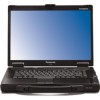Panasonic Toughbook 52 Assessing the Broad Business Case for Rugged Computing - Page 4
Stuart Carlaw, Analyst, ABI Research - standard
 |
View all Panasonic Toughbook 52 manuals
Add to My Manuals
Save this manual to your list of manuals |
Page 4 highlights
Assessing The Broad Business Case For Rugged Computing "The combination of rugged features in more consumer-grade mobile devices is at the very core of product differentiation and the growing need to cater for field force enablement. Fully ruggedized products in traditional vertical markets such as oil and gas, mining, and the military will continue to be strong...[but] there will be growth for these products in not so traditional markets." - Stuart Carlaw, Analyst, ABI Research The die, it seems, has been cast, and ruggedness is no longer just for environmentally extreme industrial and military users anymore. It is moving into the mainstream of the global 2000 and beyond. As a result, a broad spectrum of mission-critical mobile users is emerging with different levels of rugged requirements. Projections like these and others have caused a flurry of activity as non-rugged consumer and commercial-grade PC manufacturers rush in to tap this highgrowth market opportunity. In so doing, claims are being made that can be confusing to executives seeking to field a mobile work force with cost-effective and highly reliable computing resources. What they are learning, as they deploy new more rugged mobile computing equipment, is that one size does not fit all, even within an organization. It is therefore important to have an understanding of the key elements that determine the level of ruggedness that is needed by users, and that is available from the vendor community. ...Overview of Rugged Computing Rugged computing has traditionally sought to bring the promise of information technology to harsh environments, including: • Outdoors in the elements, with extreme temperatures, humidity, and precipitation; • In the presence of large quantities of airborne liquids or particulates such as in industrial, construction, or desert environments; and/or • In vehicles (including aircraft, on- and off-road land vehicles, and marine installations), which are characterized by high vibration, mechanical shocks, and violent altitude and attitude changes. The recent surge of interest in rugged mobile platforms has prompted new entrants into the field who claim a wide array of capabilities as "certifiably" rugged. In truth, manufacturer's claims of ruggedness are subjective and not uniformly understood. Currently, there is neither a single industry standard, nor an independent testing authority, for rugged computing products. Copyright © All Rights Reserved for Larstan Business Reports 4













